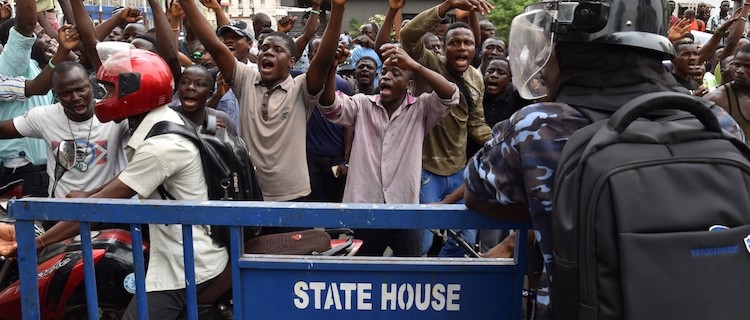By Lisa Vives, Global Information Network
NEW YORK | FREETOWN 10 July 2023 (IDN) — National elections in Sierra Leone on 24 June were swiftly rejected by the main opposition party, citing “glaring irregularities” and “violations of established electoral procedures.”
“We can no longer tolerate injustice, tyranny or usurpation of power,” the opposition All People’s Congress (APC) wrote in an official statement. African and European observers also reported statistical inconsistencies in the balloting.
President Julius Maada Bio carried the election for a second term in office by a narrow margin with 56% of the vote. His opponent, Samura Kamara, reportedly trailed in the low 40s.
Bio’s victory came as a surprise what with soaring inflation, high rates of poverty and unemployment, and widespread food insecurity over the past year. Popular protests were met with a deadly state response.
Sixty percent of Sierra Leonians believe their country is headed in the wrong direction, which led many to expect a decisive number of “change” votes in the recent general election. Few expected the incumbent to be re-elected in the first round, which required that he take over 55 percent of the votes cast.
But as the votes were tallied, key logistical challenges were noted, such as the late delivery of election materials to polling centers and the delayed opening of polling stations.
Some cases of inadequate public communication from the Electoral Commission were noted, as were gaps in levels of transparency.
Skirmishes, police arrests and attacks on polling officials and political party agents further undermined the exercise and a confrontation between security services and the opposition party on the day after elections further flared political tensions.
Members of the African Union, the West African Elders Forum and Ecowas expressed dismay over inflammatory language being used on social media. A joint statement from the U.S., UK, Ireland, Germany, France and the EU delegation went further:
In the joint statement they wrote: “We note that significant logistical problems hampered voting on election day in certain areas. We share the concerns of national and international observation missions about the lack of transparency in the tabulation process.
But the note ended with a positive spin: “Despite these difficulties, we remain committed to supporting democracy and the aspirations of the Sierra Leonean people. We urge everyone to exercise restraint, respect the rule of law,and engage in peaceful dialogue to resolve disputes.”
This is Samura’s second and possibly final run for the Presidency. He sold himself as an economic czar, the candidate with the experience to fix the economy, which he believes has been poorly managed. An economist with the World Bank, the IMF and finally as the country’s Minister of Finance, he promised to fix the economy. However, those with a longer memory recall his brushes with the law.
Samura faced allegations of fraud in dealings that led to the sales of the country’s shares in mining company Sierra Rutile. His case was later referred to the country’s anti-graft body, Anti-Corruption Commission, which he and his party dismissed as a “witch hunt.”
Later, he and other former government officials were named in a $2.5 million corruption case involving a contract for Sierra Leone’s Chancery building in New York. The case focuses on his role in the deal as the Foreign Affairs Minister. Eighteen months on, the case has been adjourned to continue after the elections in July.
While both candidates served in the military junta under Valentine Strasser, known as the National Provisional Ruling Council (NPRC), Bio trounced Kamara in subsequent elections.
Bio’s record in office was marked by several much-needed social welfare projects. He became the first Sierra Leonean president to introduce free education for primary and secondary school students in public schools. He eliminated application fees for students in government-run public universities and cancelled a China-funded four hundred-million-dollar loan agreement with the previous Sierra Leone president Ernest Bai Koroma to build a new international airport in Sierra Leone.
In February 2019, President Bio declared a state of emergency in Sierra Leone due to endemic sexual violence. He increased penalties for rape and other sexual violations.
However, under his regime, the country slipped into rising poverty. Anti-government protests in August 2022 sparked by the country’s cost of living crisis were met with violence.
A fierce critic of the President, Chernoh Alpha Bah, a contributor to the Africanist publication, was also dismissive of the election which, he said, was called before all the votes were counted.
“We must agree that there should be no short-cut to electoral democracy, he wrote in a recent issue of the Africanist, “and we need to underline that entrance legitimacy is essential to any accountable government in any part of the world.” [IDN-InDepthNews]
Photo: People gathered outside the State House in Freetown. Credit: ISS-Institute for Security Studies.
IDN is the flagship agency of the Non-profit International Press Syndicate.
We believe in the free flow of information. Republish our articles for free, online or in print, under Creative Commons Attribution 4.0 International, except for articles that are republished with permission.

